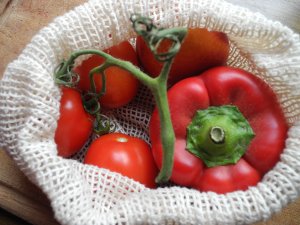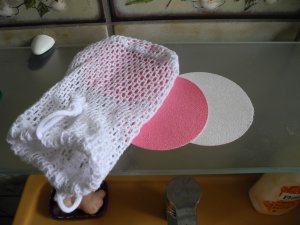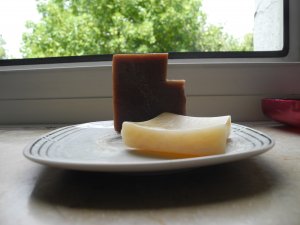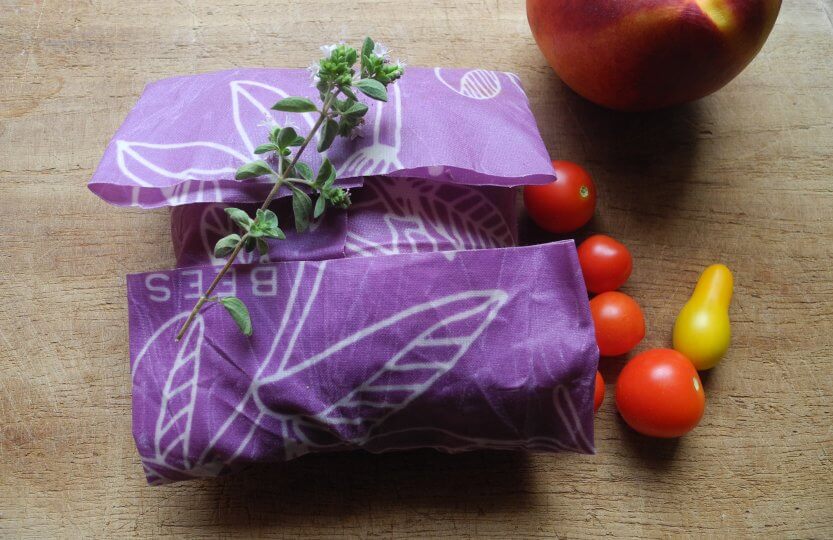On this blog we have written quite some articles targeting the huge topic of waste: We wrote about the waste production in Germany, about a visit in a waste-to-energy plant, about plogging and the EU ban on single use plastic items. So, today I would like to show you several ways and items we use in our shared flat to avoid waste:
The Classic – Reusable Drinking Bottle:

In Germany, 43 million non-reusable plastic bottles are used every day. (1) This means that everyone in Germany uses on average 192 plastic bottles per year. But there is a simple way to reduce this to only one plastic bottle: Using a reusable drinking bottle.
You can take it anywhere and as Germany has high quality tab water, you can simply refill it. Thus, you can even safe money, as tab water is usually free. There are many different types of reusable drinking bottles: Some made of plastic (make sure that they are BPA free as BPA can be harmful to one’s health), some made of glass, some made of steel. Every type has its pros and cons, so you should have a look at them and figure out what works best for you. For me, it was a reusable, BPA free plastic bottle, as it is light and cannot break.
A little side remark: You should never use single-use plastic bottles more than once, as potential toxic chemicals are seeping from many disposable plastic bottles when used more often or after contact with hot liquids. (2)
Fruit, vegetables and bread bags:
In many supermarkets, you’ll find these thin plastic bags in which you can pack your fruits and vegetables. For a long time now, I’ve tried to use them as little as possible, putting individual vegetables in my shopping cart without any bags. But it is nearly impossible not to use these plastic bags, when you are buying for example lots of small tomatoes or a lot of vegetables. An easy solution for this dilemma is to use bags made from cotton or tulle (so you can see what’s inside). Many come with a sewed in information about their weight, so it can be subtracted at the checkout. Another great way is to use them when you are buying rolls at the bakery or if you go to the weekly marked. There are many options to buy these bags e.g. on amazon, but it is also really easy to make them by yourself. If you google “diy fruit and vegetables bags” you can find many tutorials, e.g. this one. Now the only thing left is to to take the little bags with you. You could place them next to your shopping list or within the bag you usually use for shopping. As I usually go groceries shopping spontaneously after my classes, I simply keep one or two of those in the bag I take to uni.


Buying vegetables and bread with reusable cotton bags. (Photos: Katharina Funk)
Bee’s wrap:
Have you ever heard of Bee’s wrap? Bee’s wraps are cotton cloths covered with beeswax and jojoba oil, which makes them the perfect alternative to plastic wrap and tinfoil – and you can use them many times. You can wrap in you sandwich, pack a snack for the next lecture or cover a bowl in your fridge. To keep the wrap in place, you simply warm the beeswax with your hands and shape the wrap the way you like. If the Bee’s wrap gets dirty, just clean it with cold water. Easy, isn’t it? You can find the original store here but if you want to save money you can also make them yourself, check out e.g. this tutorial here.


Bee’s wrap. (Photos: Katharina Funk)
Silicone Baking Mat:
One thing I never liked about backing was that I had to use and throw away the baking paper every single time. Especially when you roast vegetables with oil – one of my favourite dishes. But then my flatmate came up with this incredible silicone baking mat. You simply use is as you would use baking paper and clean it afterwards. That’s it. One bonus: It is non-sticky, so you can remove everything very easily from it.


Different kinds of baking mats. (Photos: Katharina Funk)
Reusable Cotton pads:
When you need to remove make-up, it can easily happen that you’ll use 3-5 cotton pads per day (depending on the amount of make-up of course ?). One possibility to reduce waste here is to use reusable cotton pads or little sponges. You can wash these in your washing machine and they are as good as new. When I used sponges, I had to buy new ones every two month or so, and my (newly purchased) reusable cotton pads are said to be able to be used 100 times per piece. They came even with a little cotton bag in which you can store and wash them. I bought them at the shop where I bought my shampoo bars and my deodorant as well: Wolkenseifen.de. But you can get them from Amazon, too.

Shampoo bars:
I used to use shampoo, conditioner and shower gel, all of them neatly stored in plastic containers. This meant I would produce a lot of plastic waste during the year. To avoid this, I recently started to use shampoo bars. Shampoo bars look like common soap bars but are specifically produced to wash your hair with. Note that there is a difference between solid shampoo e.g. from lush, which you can use like any other shampoo, and shampoo bars. It takes a little time to adjust to shampoo bars, as the hair will go through a transition phase and it might be harder to untangle. To avoid this and to add shine you can also rinse your hair with apple vinegar afterwards (don’t wash it out though). Your hair will not smell like vinegar as soon as it is dry, but this might still not be for everyone. I seldom use the vinegar rinse as I don’t like the smell and use common conditioner instead. I still have to work something out there. Nevertheless, it is worth trying it out in order to avoid waste. Additionally, there are many benefits for your hair when you are using shampoo bars. Bloggers write about how much stronger their hair feels, that they have to wash it less often or how their dandruff has vanished. It is also quite easy to travel with shampoo bars: You simply cut off a small piece and put it in a little container. It is super small and handy if you don’t have a lot space in your luggage. You can order them at various online-shops (Wolkenseifen.de, Amazon…) but you can usually buy them in organic supermarktes, too. I’ve seen very recently that Cafe Freundenherz in Bayreuth offers shampoo bars as well.

Deodorant:
I was looking for a good, ecological deodorant for a long time. I felt that the natural deodorants I could buy in the drugstore where less effective than “normal” ones. So, I kept using the normal ones for a long time, until my flatmate let me try out her deodorant – might sound weird but it is not a roll-on as you will see. Coming in a little aluminium container it was a deodorant lotion, which you can simply apply with you finger just as any other lotion. When using enough (and you don’t need much) it was for me just as effective as any other deodorant. And it is free from aluminium salts and palm oil! (Read more about palm oil here.)Two little flaws: Until it is absorbed by the skin it looks white, but it won’t colour you clothing at all. And it “melts” if the temperature outside is too high. So you cannot use it when traveling in warm countries. It is a bit more expensive than common deodorants but keep in mind that one container will last for several months. We bought this deo at Wolkenseifen, a German natural cosmetics store.

How are you avoiding waste? Is there anything we could add to this article? Tell us in a comment!










Wonderful blog, cotton bags are helpful for nature and many benefits of using it . It is a nice blog, and good for world. We must use Cotton bags to carry things.
Amazing article. Very educational and instructional. It has helped us a lot! Thanks for sharing!
Very beneficial. Thank you for sharing this incredible knowledge 🙂
Very incredible post